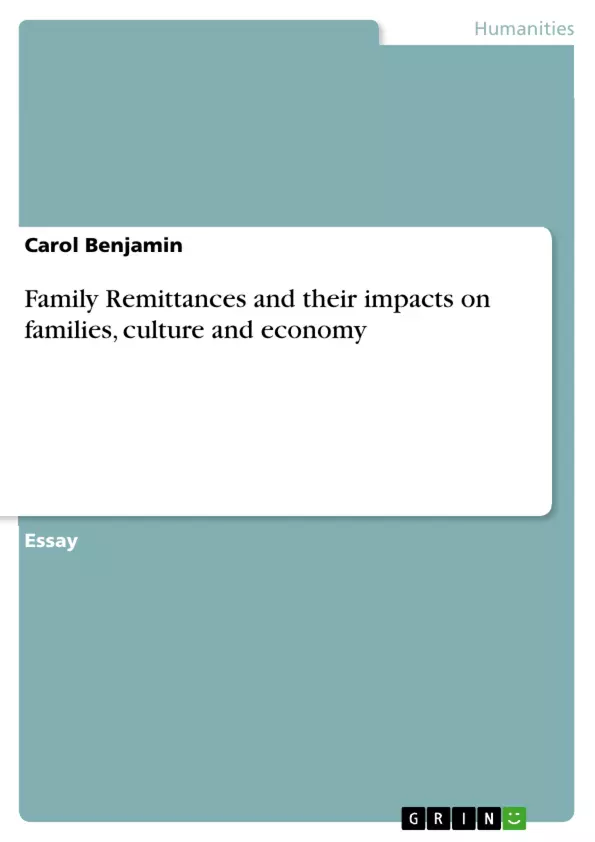This article explains the importance of remittances in various countries of Latin America and the Caribbean. The impact on numerous families, culture and the economy is discussed. Various authors show the significance of remittances which account for a sizable part of these countries' economic growth. The article also explains the importance of remittances in Latin America and the Caribbean in relationship to foreign investments, tourism or other income sources.
Inhaltsverzeichnis (Table of Contents)
- Migration and Remittances
- The Impact of Remittances on Families and Communities
- The Economic Impact of Remittances
- The Cultural Impact of Remittances
- The Future of Remittances
Zielsetzung und Themenschwerpunkte (Objectives and Key Themes)
This paper explores the multifaceted impact of family remittances, focusing on their influence on families, culture, and the economy. It examines both the positive and negative implications of these financial transfers, analyzing how they shape the lives of individuals and communities.- The economic benefits of remittances for families and communities.
- The cultural implications of remittances, including changes in consumption patterns and lifestyles.
- The potential for negative impacts on the economy, such as dependence and inequitable growth.
- The role of remittances in shaping the lives of migrant families and their communities of origin.
- The future of remittances and their potential for sustainability.
Zusammenfassung der Kapitel (Chapter Summaries)
The paper begins by defining remittances and outlining their growing importance in Latin America and the Caribbean. It highlights the significant financial flows from migrants abroad to their families back home, highlighting the scale and significance of these transfers. The author then discusses the economic benefits of remittances for families and communities, providing examples of how they improve standards of living and contribute to economic stability. The paper further delves into the cultural impact of remittances, exploring how they influence consumption patterns, lifestyles, and even cultural identity. The author draws upon personal experiences and anecdotal evidence to illustrate how remittances have contributed to the adoption of new cultural practices. The paper also acknowledges the potential negative impacts of remittances, such as the risk of dependence and inequitable growth. It discusses concerns about the over-reliance on remittances and the potential for negative consequences for local economies.Schlüsselwörter (Keywords)
The key focus of the paper centers on family remittances, their economic impact, and their cultural implications. The paper examines the role of remittances in shaping the lives of migrant families and their communities of origin, exploring both the benefits and drawbacks of these financial transfers. Key terms and concepts include migration, remittances, economic development, cultural change, dependence, and globalization.Frequently Asked Questions
What are family remittances?
Family remittances are financial transfers made by migrants working abroad to their families and communities in their home countries.
How do remittances affect the economy of Latin America?
They account for a sizable part of economic growth in many countries, often surpassing income from tourism or foreign investments.
What is the cultural impact of remittances?
Remittances can lead to changes in consumption patterns, lifestyles, and the adoption of new cultural practices influenced by the migrant's host country.
Are there negative impacts of relying on remittances?
Yes, risks include economic dependence, inequitable growth, and potential negative consequences for local labor markets.
How do remittances influence family life?
They generally improve the standard of living and provide stability, but the migration itself can also alter family structures and relationships.
- Citar trabajo
- Carol Benjamin (Autor), 2005, Family Remittances and their impacts on families, culture and economy, Múnich, GRIN Verlag, https://www.grin.com/document/265618



